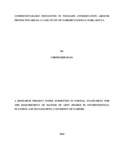| dc.description.abstract | The general objective in this study was to assess community based initiatives around Nairobi National Park. To achieve this, the researcher specifically, identified membership of community based initiatives in NNP; analyzed the benefits of CBIs to the participating community; examined the effects of CBIs on wildlife conservation around NNP and the challenges facing the running of these CBIs. The study hypothesis was that wildlife conservation is significantly independent of community based initiatives. The study followed a survey design with a sample size of 66 respondents selected using random sampling techniques. Data was collected from the community using questionnaires with both closed and open ended questions. Key informants interviews and Focused group discussions were also conducted. Data was analyzed quantitatively using frequencies and percentages with hypothesis testing done using chi square. The presentation of results was done in figures, tables and charts. The results show that training, education and awareness (24.8%), direct payment in form of rent and land (24.4%) and compensation from predated livestock (22.4%) were the most stated benefits. CBIs have led to reduction in human-wildlife conflicts to a large extent (42.6%) while pollution relating to urban development has only reduced to a small extent (40.4%). In addition, the findings revealed that, meeting community expectation (12.5%), urbanization challenges (12.2%) and lack of sufficient funds for CBIs were the challenges hindering implementation of CBIs in wildlife conservation. The chi square test of independence yielded, calculated value (15.341)> critical value (0.004), thus the null hypothesis that wildlife conservation is significantly independent of CBIs was rejected. The study recommends that the CBIs be built on a foundation where the community can realize real benefits of conserving wildlife such as engagement in ecotourism activities, alongside constant aeration of awareness on importance of conserving wildlife and more budgetary allocation for land lease fee and compensation of predated livestock. Area of evaluating the cost and benefit for CBIs vis a vis wildlife conservation should be considered for future research. | en_US |



